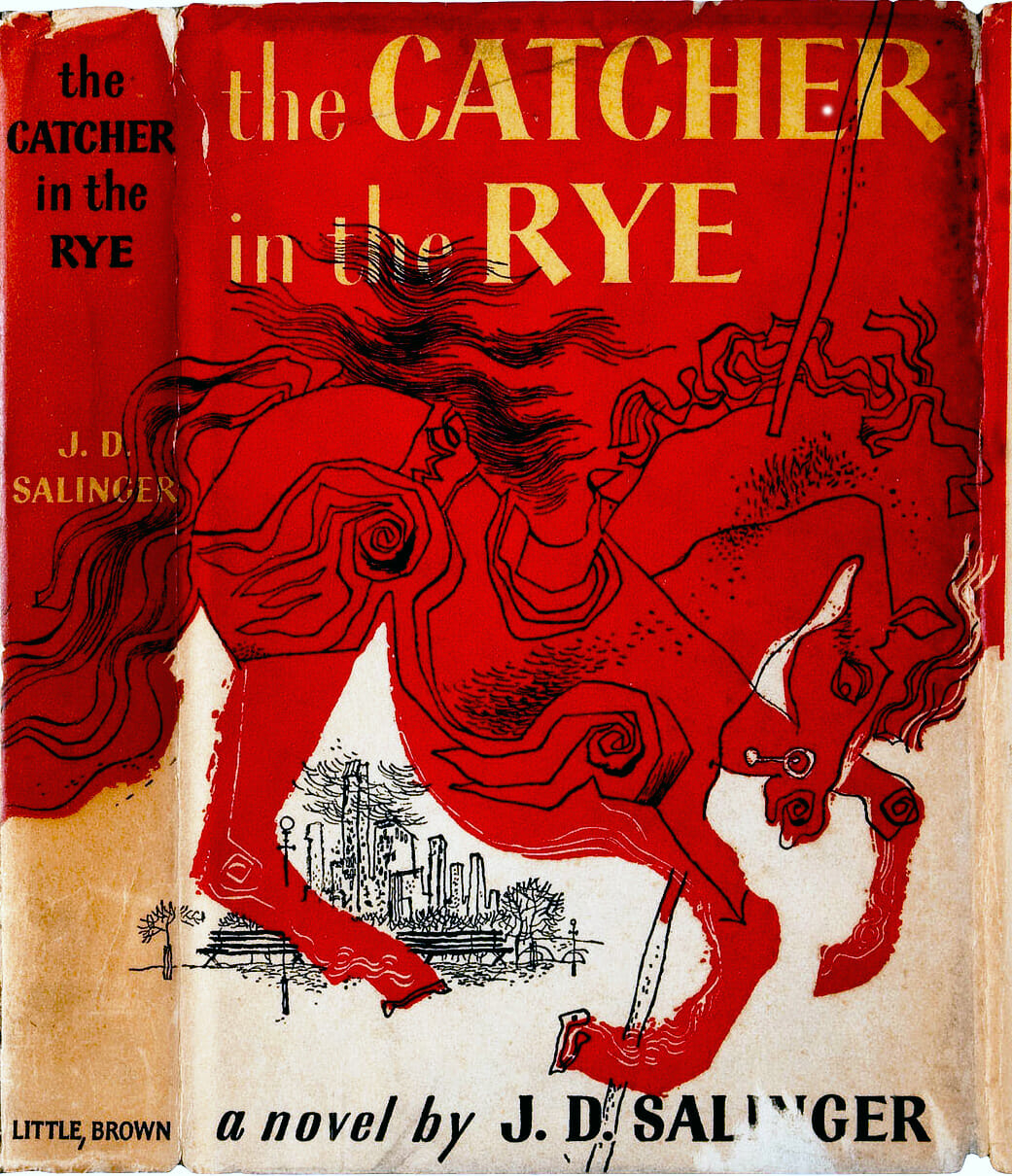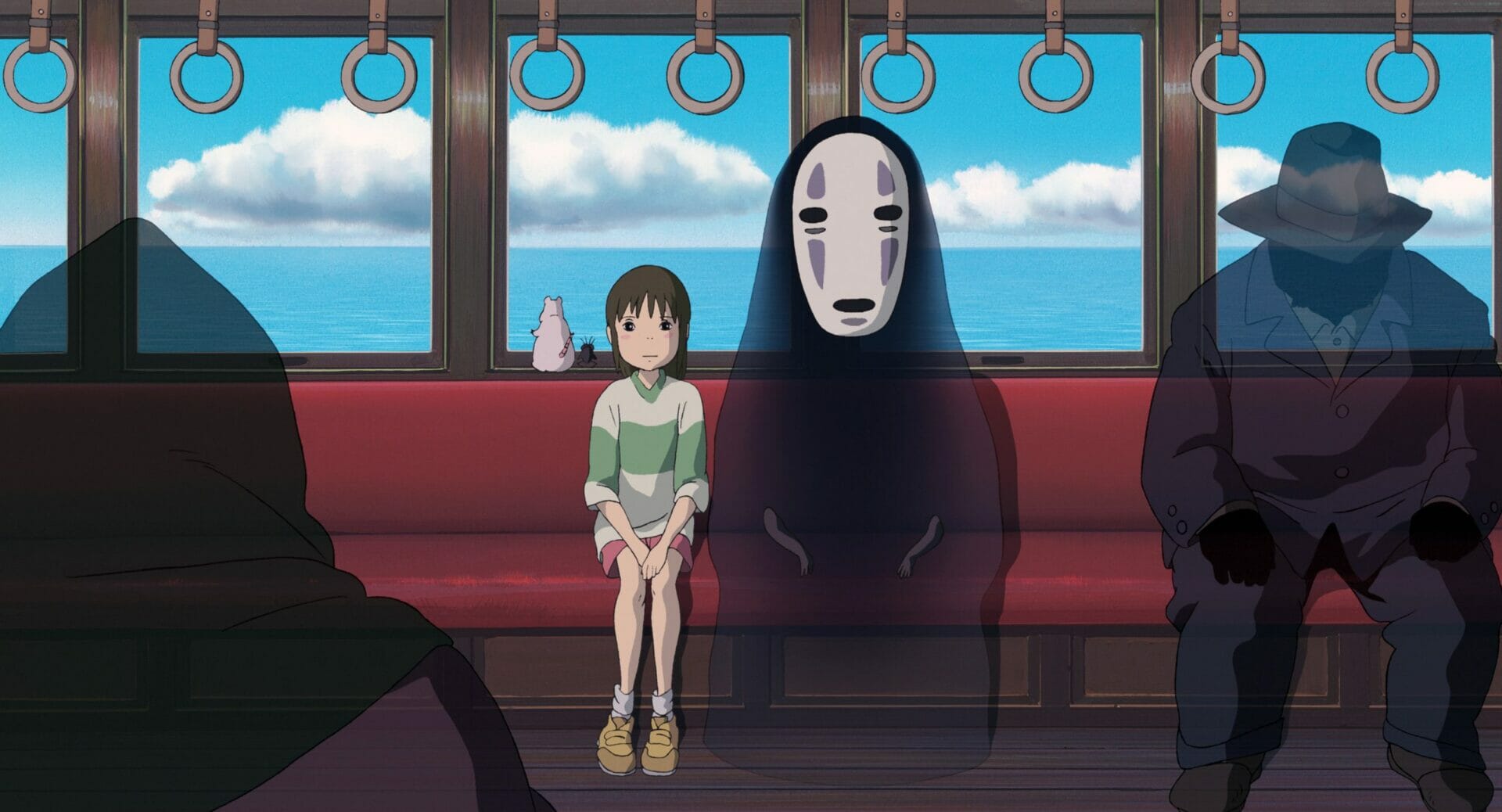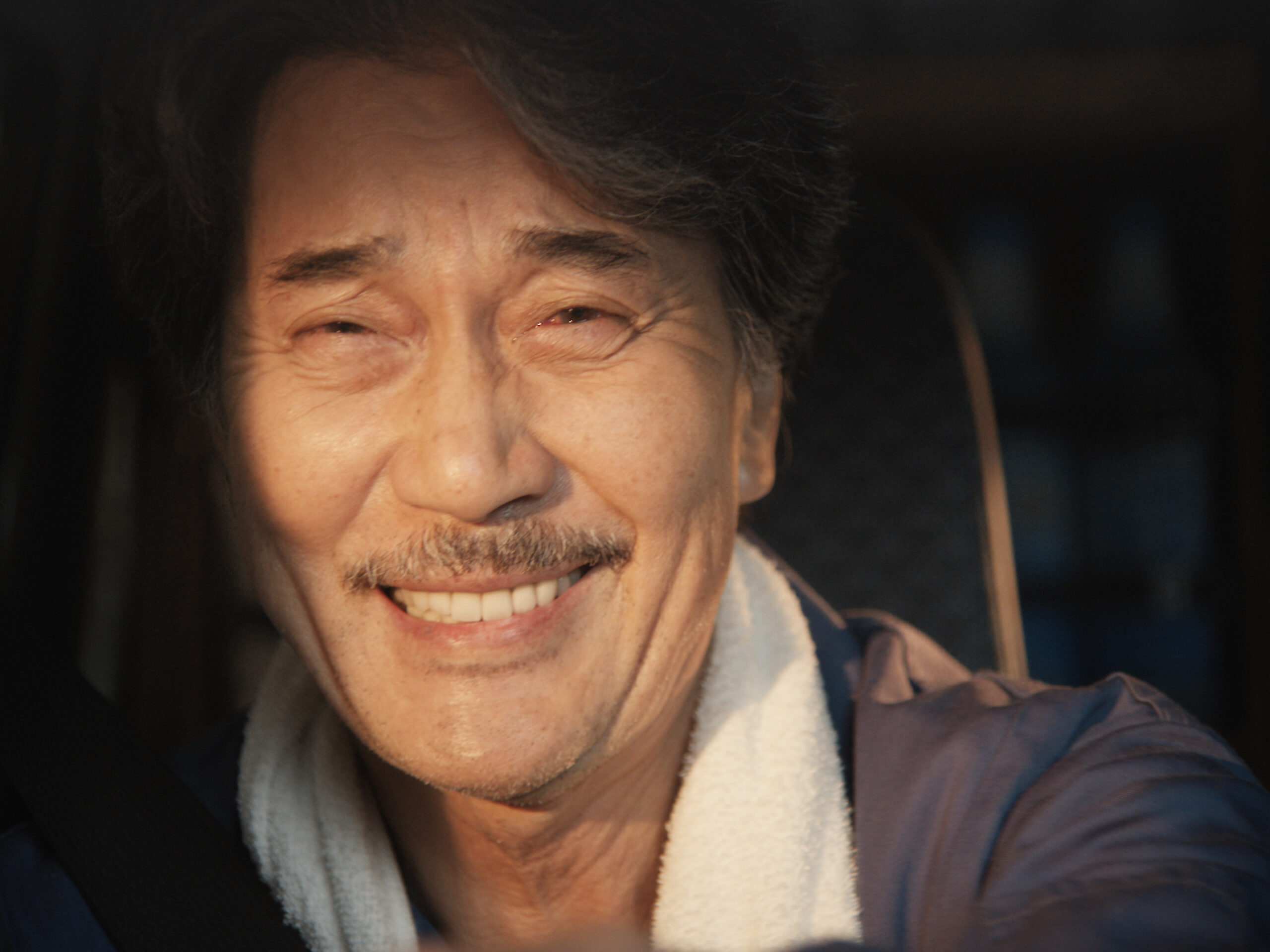
Perfect Days by Wim Wenders | The Resistance of Everyday Life
Year
Runtime
Director
Cinematographer
Production Designer
Format
Genre
Komorebi is a Japanese word that translates to “sunlight filtering through trees”. It embodies a fleeting, unrepeatable vision that can linger in the mind. Japanese literature often uses komorebi as a metaphor for the transience of life – sunlight filtering through branches, similar to the moments of beauty that illuminate everyday life.
German director and screenwriter Wim Wenders returns to the big screen with an intimate and poetic movie that celebrates the beauty of the every day and takes these visions as its central theme. Perfect Days tells the story of Hirayama (Koji Yakusho), a solitary man leading a simple life marked by a perfect routine. Throughout the movie, the viewer witnesses him quietly appreciating the komorebi in a ritualistic silence. Working as a janitor in Tokyo’s public bathrooms, Hirayama meticulously engages in various activities – from work to music, books, plants, and photography. Perfect Days is an ode to the beauty of the ordinary, an invitation to rediscover the wonder of the world around us. It’s a movie that speaks volumes with very few words.
- The Repetition of a Gesture
- The Intimate Resistance
- The Symbols
- The Tree and the Plants
- The Analog
- The House
- Places
- Tokyo and Food
- The Guest
- Resistance or Alienation
- Feeling Good
- Awards and Nominations
The Repetition of a Gesture
Koji Yakusho’s portrayal of Hirayama stands out as one of the movie’s strengths. The Japanese actor excels at bringing to life a reserved and introverted man who finds happiness in the repetition of small gestures. These performative acts form a harmonious choreography hidden in the disorder of things, even when it comes to cleaning public bathrooms. Hirayama prefers to spend time alone, listening to rock music on old cassette tapes as a daily ritual, whether it’s The House of the Rising Sun by the British group The Animals or Lou Reed‘s Perfect Day.
As Silvio Danese noted for Cinematografo, Hirayama’s work in Perfect Days is portrayed as an art form or kata. This Japanese term refers to a sequence of codified movements found in various martial arts and Noh Theater. In Hirayama’s case, the cleaning kata is an expression of his everyday nature. The movie goes beyond the depiction of cleaning as an aesthetic or symbolic activity; it becomes primarily a regenerative action that leads to humility. As stated by Hidesaburo Kagiyama, a Japanese manager and author of the best-selling entrepreneurship book Toilet Cleaning Management, anyone dedicated to toilet cleaning will naturally develop a state of mind characterized by humility.
The Intimate Resistance
The Spanish philosopher and essayist Josep Maria Esquirol refers to it as intimate resistance, a form of struggle for existence in the presence and proximity that opposes the void images of nihilistic experience. “To exist is already, in part, to resist,” says the philosopher. Intimate resistance is not seen as an obstacle between man and desire but as a fundamentally human impulse in facing the processes of disintegration and corrosion of the surrounding environment. For example, the ritual act of cleaning and preserving old cassette tapes, saving sprouts in a park, and watering small plants.
In a context as ultra-capitalist as Tokyo, one dimension of reality is even more disintegrative. Existentialist literature has often presented a view of man as a project, of life as construction and adventure. Yet, if this narrative is now being exploited by the system, for Wenders, the activist is the worker who is not seeking an expansive achievement, but a protective and reparative one.
The silence of those who gather is a methodical silence – literally, it is a path – seeking to see better. Sharpening the senses, staying open and vigilant; transforming eyes into ears and ears into eyes.
La resistencia íntima, Barcelona, Acantilado, 2015.
The Symbols
The days in Perfect Days are very similar and yet unique. They are profoundly quiet and yet musical. What may seem like deep solitude for Hirayama is quite the opposite. His presence makes him a daily companion to every element that fills his days. Unlike Roquentin, the protagonist of Jean-Paul Sartre‘s Nausea, who lives alone and speaks to no one, “receives nothing, gives nothing”.
Neither receiving nor giving anything defines a position at the exact opposite pole of Hirayama’s presence, always ready to embrace words. His thoughts are generous, and his actions are conscious. To quote Esquirol again: “There is no resistance without modesty or generosity. Hence, presumption and selfishness are symptoms of its absence.” This applies to those who struggle to resist in their daily lives. Wenders has a special talent for capturing the poetry of everyday life, reaching its peak in Perfect Days through a series of powerful symbols that invite curious exploration.
The Tree and the Plants
At lunchtime, Hirayama sits in the park, observing sunlight filtering through the branches. The tree symbolizes fall and rebirth, expressing both cut and continuity, and holds a central place in Zen symbolism. As he contemplates the komorebi, it becomes a total and sensitive presence. Unlike the circus elephant in Manzhouli, portrayed in Hu Bo‘s 2018 movie An Elephant Sitting Still, whose sitting represents hunger and surrender to life, Hirayama’s is one of participatory admiration.
Esquirol argues that happiness isn’t found, but created – a process that requires commitment and the ability to appreciate the small things in life. Hirayama perfectly embodies this view. His life consists of small gestures, and it’s in these gestures that beauty lies. The care he takes to water the small plants every day is an element that gives meaning to his life. Similar to The Little Prince, it’s the time spent on the rose that makes the rose meaningful.
The Analog
Wenders portrays the harmony and solitude of Tokyo through its distinctive locations. This immediate and sensory approach allows the viewer to immerse themselves in the life of the city and to sense Hirayama’s presence in every place he visits. Another symbol that delves into the theme of impermanence in Perfect Days is analog technology, specifically cassette tapes and film photographs. The obsolete cassette tape format symbolizes the fragility and transience of life. For Hirayama, listening to cassette tapes is an experience of reconnecting with the past. The tapes, with their occasionally unfaithful sound, bridge the present and the past, the material and the immaterial. Spontaneous and selfless care. Even when Takashi (Tokio Emoto), the protagonist’s colleague, tries to make him understand – and exploit – their economic value for collectors, Hirayama reacts with indifference.
Film photography stands as a tangible symbol of anticipation. At a time when instantaneity is a way of defining reality, the film evokes a slower process, emphasizing the transience of the moment captured and the delicacy of its evolution. In this reflection, film becomes not only an artistic medium but also an expression of a past time. A past confronted with a commitment that, in contrast to shallowness, takes on the value of rare beauty. The analog nature of the cassettes is the meeting point between Hirayama and Aya (Aoi Yamada), a friend of Tajashi, who, unlike the boy, represents a youth that feels the call of its roots, a different rhythm and a different way of living.
The House
In the movie, emptiness dissolves boundaries, disintegrates finiteness, and reveals reciprocity. Hirayama’s life begins and ends at home. The house symbolizes salvation from dissolution, a refuge from the forces of disappearance. The abyss temporarily lessens through the protection of the home, treated like a temple with its rituals. This modest dwelling of the protagonist seems perfect to represent refuge. The confined center requires limitations.
As the French philosopher Gaston Bachelard argued in The Poetics of Space (1958), there needs to be a house within a larger house to experience withdrawal and a problem-free life. Like a child improvising a fort with pillows under the table, Hirayama in Perfect Days lies on his blanket on the tatami to read before bedtime. In The Poetics of Reverie, Bachelard wondered if the true home is where one sleeps or where, once asleep, dreams are woven. Every night, with regularity, Hirayama dreams, dreams of childhood, devoid of colors.
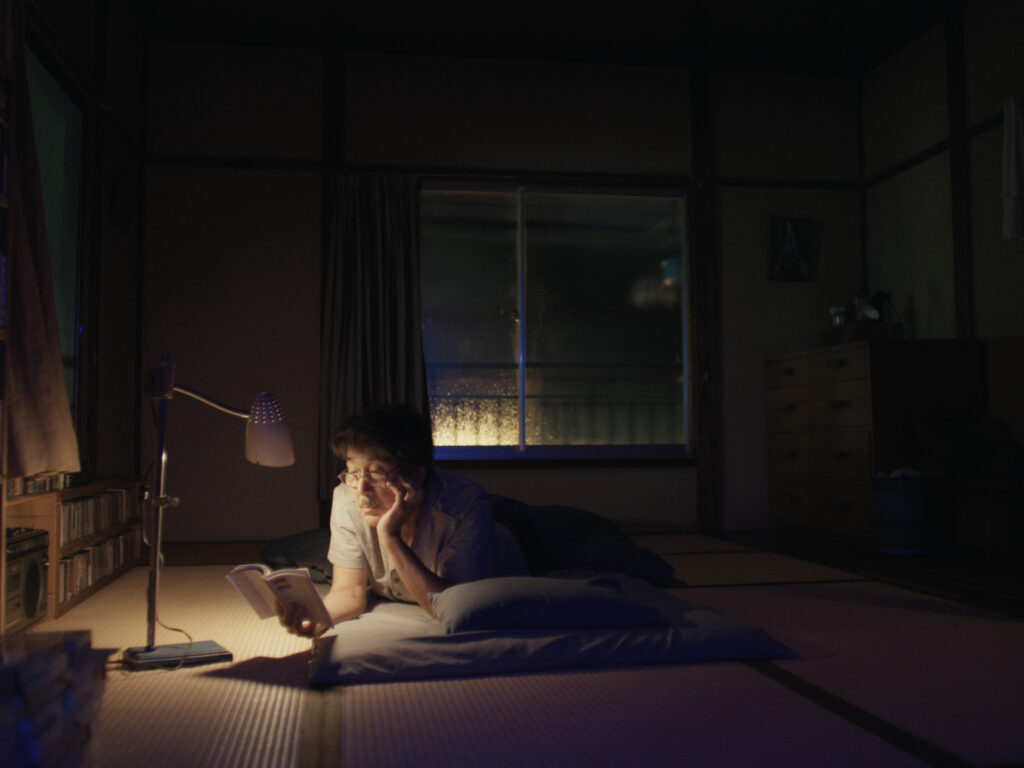
Places
In Perfect Days, Wenders uses precise, attentive, and thoughtful shots to underscore the importance of places in Hirayama’s life. The work van’s cabin is a simple and spartan place, but also a familiar and comforting refuge. The garden is a place of peace, the apartment a place of withdrawal.
Public bathrooms, each a design masterpiece by a different architect, become icons of the ambiguity of perception. For a citizen, they are simple restrooms, but for those who look and learn to observe them, they become unique temples. Hirayama is the priest who explains to passersby how to use them, holds the keys, and grants them entry. Finally, the toilets, with their framing, represent the contrast between modernity and tradition in Tokyo. The director began working on the movie from this point, approached by a municipal institution for a documentary on the new architecture of public bathrooms. Their poetics quickly transform into the final idea, with which the author continues to pay homage to the director Yasujirō Ozu.
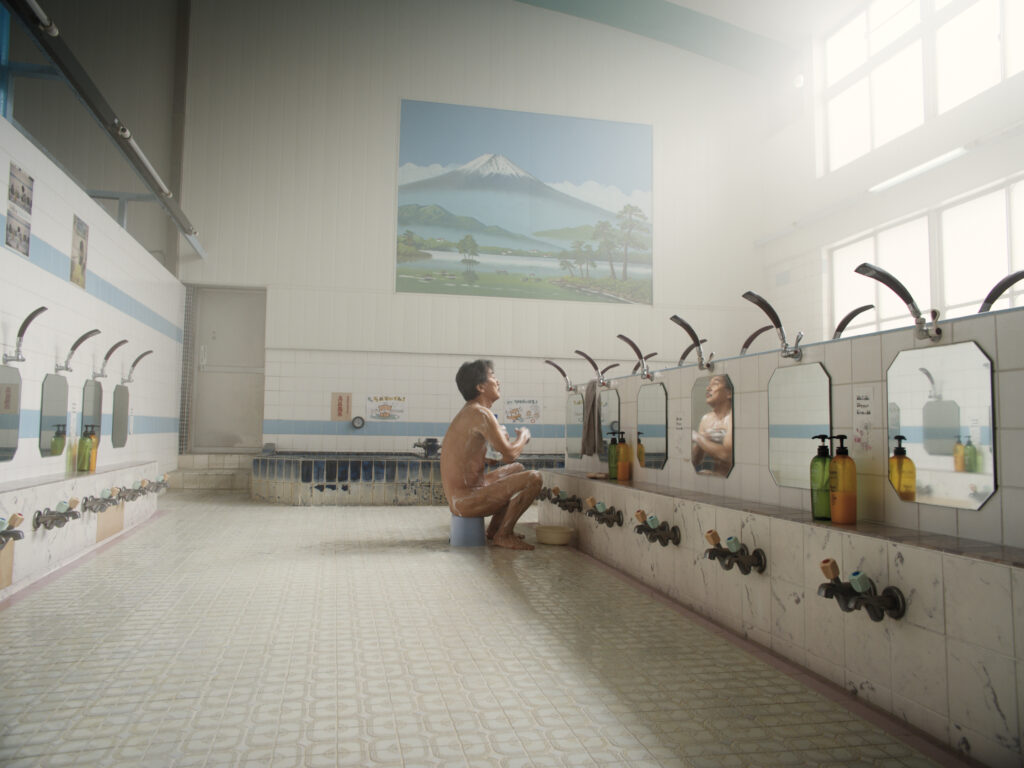
Tokyo and Food
Tokyo is a city that Wenders has explored multiple times, as seen in Tokyo-Ga (1985), a documentary about the director’s first visit to the city. In Notebook on Cities and Clothes (1989), a retrospective on the stylist Yamamoto, the city again serves as both backdrop and protagonist. It becomes clear that each element of the city has its narrative function.
The Sentō, a traditional public bath where Hirayama washes himself every day, represents two forms of nonverbal communication in Japan: the sharing of nudity (hadaka no tsukiai) and physical intimacy (skinship). The bar table is a place of social interaction, where Hirayama can meet others and listen to their stories. Hirayama never really eats alone, whether it’s a sandwich during a break or ramen after a “hard day’s work”, the act of enjoying food takes on a spiritual dimension. Only someone capable of profound solitude can truly be in the company of others.
The Guest
The desire for protected intimacy has roots so deep it eludes us. What makes a home fundamental is the idea of being able to return to it. In Perfect Days, the home takes shape through hospitality, from that offered to the niece to the daily favors for those who inhabit Hirayama’s life. The Czech philosopher Jan Patocka asserts that the essential hospitality is offered to one’s neighbor; the other is the true home:
From the very beginning of life, man is immersed, rooted primarily in the other, and this rooting in the other serves as a mediator for all other relationships. The other is primarily the one who takes care of our needs […]. The other – or rather, in the natural and inevitable network of reciprocal relationships, others – is what protects us, what makes the earth truly earth for me, the sky truly become sky. Others are the original dwelling.
Jan Patocka, The Natural World as a Philosophical Problem, Northwestern University Press, 2016.
The unexpected visit of Hirayama’s niece, Niko (Arisa Nakano), disrupts his tranquility. Niko is a rebellious girl who is dissatisfied with her family life and seeks refuge with her uncle. Hirayama seems to be the only family member with whom she has a genuine connection. Niko’s arrival brings the past to light, as the protagonist grew up in an affluent family. For reasons the movie only hints at, he felt he didn’t belong to that world, choosing instead a simple and humble career.
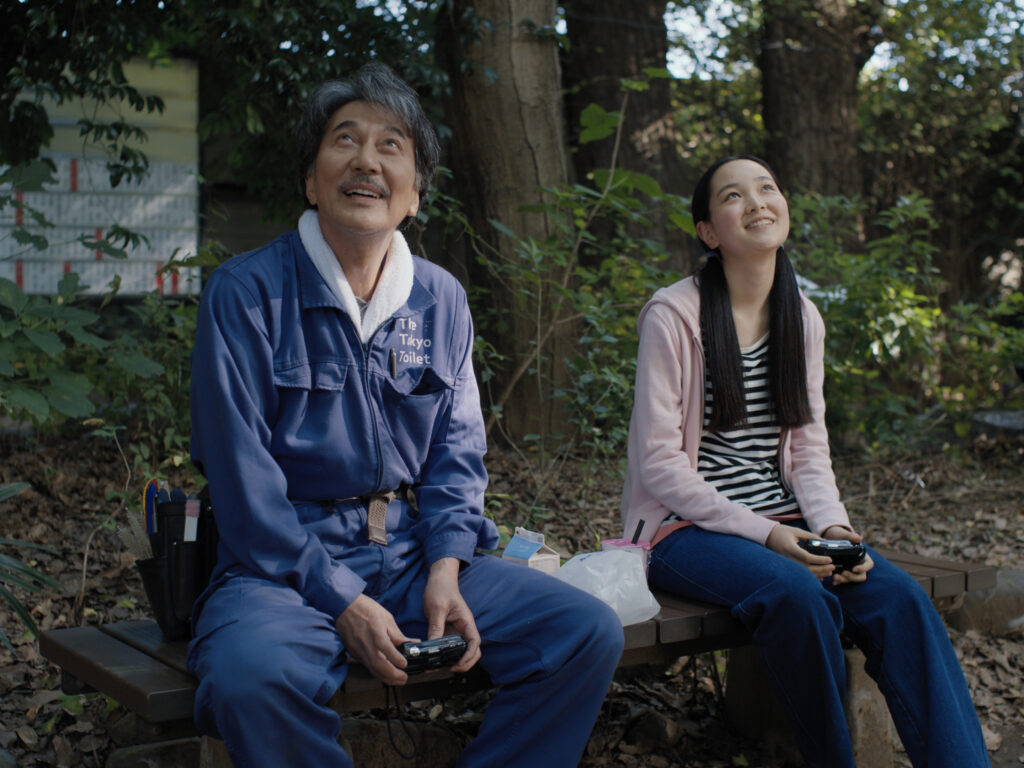
Resistance or Alienation
In an ultra-capitalist society, workers often face oppressive routines and a lack of control over their time and activities. In this context, the possibility of radical resistance, manifested in forms of open conflict, may seem remote. Wenders’ movie suggests that it’s always possible to find forms of resistance, even small and seemingly insignificant ones. It might be easy to see these gestures as illusory or symptomatic of total alienation.
Hirayama’s work epitomizes a demeaning and humiliating task. For example, when he helps a child find his mother, she only cares about sanitizing the child’s hand. Nevertheless, every aspect of Hirayama’s daily life becomes a form of reclaiming time and life, a space for self-realization. When the mother walks away with her child, not even acknowledging the protagonist, he smiles satisfactorily at the child and waves goodbye. The child, passing by, turns and reciprocates.
In a context where the rhythm is dictated by production and consumption, Hirayama chooses to carve out moments to indulge in his passions. Eating a sandwich alone becomes an act of resistance against the frenzy. Similarly, the loving care for his plants can be seen as an act of resistance to the logic of consumption and discard. Hirayama chooses to nurture something living and fragile, requiring time and attention. The meticulousness and constant search for improvement and the beauty of the perfect gesture (shokunin) are a political and ideological statement.
The acts of resistance in Perfect Days are not illusory or symptoms of total alienation. On the contrary, they are a way of keeping one’s humanity alive in a world that tends to dehumanize and disintegrate.
Feeling Good
A sense of oppressive claustrophobia arises as the monotony becomes palpable. But even this crumbles with the salvation of dawn, in the emotion of the beauty of life, which, despite its repetition, always holds surprises, unexpected encounters, and wonder: the night before, Hirayama finds himself drinking with a newly acquainted man who opens up, sharing a precious moment of intimacy. The morning after, a lingering close-up of Hirayama bursting into tears of emotion concludes the movie. Having been a spectator of the world around him, the public becomes a spectator of Hirayama at the end, witnessing his beauty – the ability to remain sensitive. Perfect Days is an anthem of resistance through small things. It reminds us that happiness is within our grasp. It just needs to be cultivated every day, like tending a small plant.
Awards and Nominations
Perfect Days premiered on May 25, 2023, in competition for the Palme d’Or at the 76th Cannes Film Festival, where it won the Ecumenical Jury Prize, and Koji Yakusho received the Prix d’interprétation masculine. Perfect Days also earned a nomination for Best International Film at the 96th Academy Awards.









